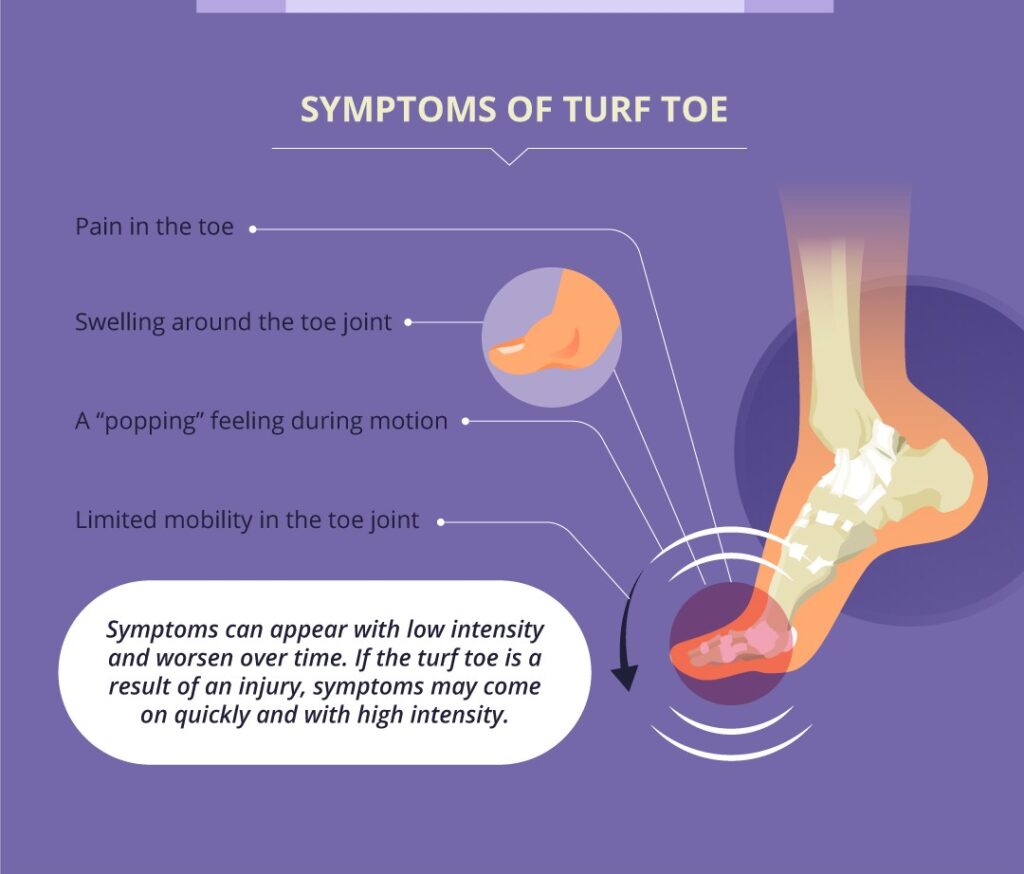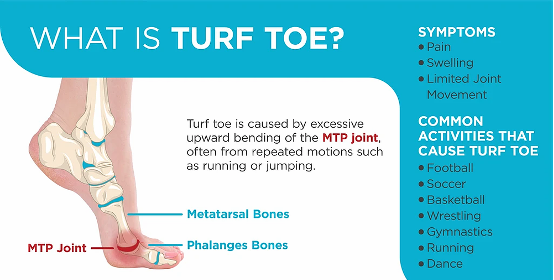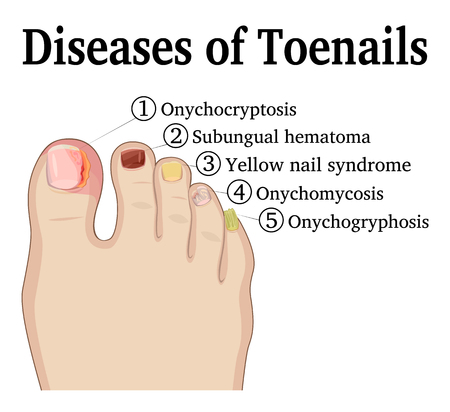Unlock the secrets to overcoming Turf Toes with our comprehensive guide. Learn about causes, symptoms, effective treatment options, and preventive measures to manage this common sports injury and ensure a rapid return to your active lifestyle.
What is Turf Toe?
Turf toe is an injury characterized by the sprain of the big toe’s main joint, caused primarily by excessive bending or hyperextension. This condition is notably linked to sports played on artificial surfaces, where the foot’s grip on the turf can force the toe into extreme extension. Nonetheless, turf toes can arise from activities on any surface that place undue stress on the big toe.

Causes of Turf Toes
The excessive upward flexion of the big toe joint is the root cause of turf toes, occurring through various mechanisms:
- Sports Participation: Athletes engaged in football, soccer, basketball, and gymnastics face a heightened risk due to abrupt movements that exert pressure on the toe.
- Artificial Turf: The risk is amplified on artificial turf, where the foot’s strong grip on the surface can cause the toe to overextend.
- Poor Footwear: Shoes lacking adequate support or flexibility can also lead to turf toes, as they fail to shield the toe from excessive force
Symptoms of Turf Toes

The symptoms of turf toes can range in severity but typically include:
| Pain at the big toe’s base |
| Swelling and inflammation near the toe joint |
| Restricted movement of the joint, leading to walking difficulties |
| In severe cases, a popping noise may be heard at the injury’s onset. |
Diagnosis
Effective diagnosis is crucial for the proper management of turf toes. Healthcare professionals begin with a detailed physical exam, focusing on the toe’s mobility, swelling, and pain points. X-rays are typically employed to exclude bone fractures, while MRI scans may be utilized for a closer examination of soft tissue damage. These diagnostic tools are essential for understanding the injury’s extent and planning appropriate treatment strategies.
Treatment Options

The goal of treating turf toe is to relieve pain, reduce inflammation, and restore functionality. Initial treatment usually involves conservative methods, such as:
Rest: Essential for recovery, resting the toe reduces stress on the injured area, promoting tissue repair.
Ice: Applying ice packs can decrease swelling and pain, serving as an immediate post-injury intervention.
Compression: Wrapping the toe provides support and helps manage swelling.
Elevation: Keeping the foot elevated aids in reducing swelling and speeding up the healing process.
Pain Management: NSAIDs are recommended for controlling pain and inflammation under medical guidance.
Physical Therapy: Vital for rehabilitation, physical therapy helps regain strength, flexibility, and range of motion, ensuring a safe return to activities.
Surgical options may be considered for severe injuries or when conservative treatments fail to provide relief, focusing on repairing significant damage to the toe joint and its surrounding structures.
Prevention and Management
To safeguard against turf toes, particularly for athletes and active individuals, adopting preventative measures is key. Here are effective strategies to minimize the risk:
- Choose the Right Shoes: Selecting footwear that fits well and provides ample support is crucial. Shoes tailored for specific sports activities can offer extra protection, helping to prevent the toe from overextending.
- Strengthening Exercises: Engage in regular exercises aimed at fortifying the muscles around the foot and toe. Focusing on the big toe strengthens this area, enhancing stability and reducing the likelihood of injury.
- Increase Activity Gradually: Sudden spikes in the intensity or duration of sports activities can be harmful. A gradual escalation allows the body, including the toes, to adjust to new levels of demand, thereby lowering the chance of experiencing turf toes.
Understanding how to diagnose and treat turf toes, along with implementing these preventive measures, equips individuals to effectively handle this condition. Prompt action, coupled with a well-rounded approach to care and prevention, facilitates a quick recovery and lessens the disruption caused by turf toes to one’s active lifestyle.
| Arch Support |
| Arch Supports |
| Best Arch Support Insoles |
| Best Insole for Plantar Fasciitis |
| Insole for Flat Feet |
FAQ Section
Q: What exactly is Turf Toe?
A: Turf Toe is an injury resulting from the sprain of the big toe’s main joint, typically caused by its excessive upward flexion or hyperextension.
Q: Who is most at risk for Turf Toe?
A: Athletes participating in sports that involve abrupt movements, such as football, soccer, and basketball, especially on artificial turf, are at a higher risk.
Q: How can I tell if I have Turf Toe?
A: Symptoms include pain at the base of the big toe, swelling, limited joint movement, and sometimes a popping noise at the injury onset.
Q: What are the best treatment options for Turf Toe?
A: Initial treatments include rest, ice, compression, elevation, and NSAIDs for pain management. Physical therapy is crucial for rehabilitation, and surgery may be considered for severe cases.
Q: How can I prevent Turf Toe?
A: Prevention strategies involve wearing appropriate footwear, engaging in strengthening exercises for the foot and toe, and gradually increasing activity levels.
Conclusion
Turf Toe doesn’t have to sideline you from the activities you love. With the right knowledge on diagnosis, treatment, and prevention, you can effectively manage this condition and ensure a speedy recovery. Embrace these strategies to protect your toes and maintain your active lifestyle without interruption. Remember, early intervention and a comprehensive approach to care are key to overcoming Turf Toe and getting back in the game.



MOST COMMENTED
Animal-Based Proteins / Casein Protein / Dietary Protein / High-Protein Diets / Pea Protein / Plant-Based Proteins / Protein / Protein Deficiency / Protein Supplements / Proteins / Whey Protein / Whey Proteins
Is Protein Powder Safe for Teenagers and Children?
Animal-Based Proteins / Casein Protein / Dietary Protein / High-Protein Diets / Pea Protein / Plant-Based Proteins / Protein / Protein Deficiency / Protein Supplements / Proteins / Whey Protein / Whey Proteins
Unlock the Power of Proteins for Optimal Gut Health
Multivitamin
Total Health: Multivitamin for Active Lifestyles
Multivitamin
WellnessFusion: Complete Multivitamin Support
Dietary Supplement
Revitalize Your Health: The Magic of Red Yeast Rice Capsules
Foot care / Foot Health
Revitalize Your Foot Care Routine: Essential Tips for Optimal Foot Health
Foot Problem / Diabetics / Foot Health
Diabetics: Mastering Footwear Selection for Enhanced Foot Health and Ultimate Comfort
Exercises and Footwear Tips for Hammertoe Relief / Foot care / Foot Health / Foot Pain / Foot Problem / Hammertoes
Unlock Effective Exercises and Footwear Tips for Hammertoe Relief
Hammertoes / Foot Health / Foot Pain / Foot Problem
Unlock Relief: Essential Guide to Hammertoes Causes, Symptoms, and Treatments
Foot Problem / Foot Health
Revolutionize Your Recovery: Natural Remedies for Plantar Fasciitis – Fresh Home Keepers